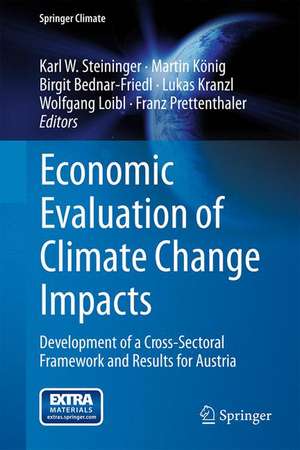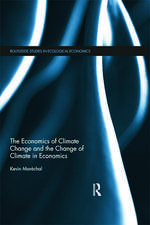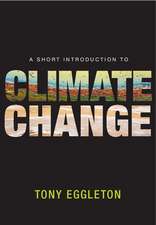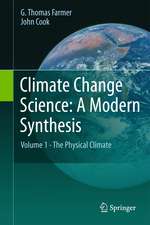Economic Evaluation of Climate Change Impacts: Development of a Cross-Sectoral Framework and Results for Austria: Springer Climate
Editat de Karl W. Steininger, Martin König, Birgit Bednar-Friedl, Lukas Kranzl, Wolfgang Loibl, Franz Prettenthaleren Limba Engleză Hardback – 23 mar 2015
| Toate formatele și edițiile | Preț | Express |
|---|---|---|
| Paperback (1) | 649.71 lei 6-8 săpt. | |
| Springer International Publishing – 9 oct 2016 | 649.71 lei 6-8 săpt. | |
| Hardback (1) | 656.25 lei 6-8 săpt. | |
| Springer International Publishing – 23 mar 2015 | 656.25 lei 6-8 săpt. |
Din seria Springer Climate
- 18%
 Preț: 1014.45 lei
Preț: 1014.45 lei - 15%
 Preț: 644.95 lei
Preț: 644.95 lei - 20%
 Preț: 753.12 lei
Preț: 753.12 lei - 18%
 Preț: 730.79 lei
Preț: 730.79 lei - 20%
 Preț: 505.40 lei
Preț: 505.40 lei - 17%
 Preț: 362.54 lei
Preț: 362.54 lei - 15%
 Preț: 646.62 lei
Preț: 646.62 lei - 18%
 Preț: 910.26 lei
Preț: 910.26 lei - 18%
 Preț: 1009.70 lei
Preț: 1009.70 lei - 18%
 Preț: 781.94 lei
Preț: 781.94 lei - 18%
 Preț: 1128.57 lei
Preț: 1128.57 lei - 18%
 Preț: 960.13 lei
Preț: 960.13 lei - 20%
 Preț: 513.22 lei
Preț: 513.22 lei - 18%
 Preț: 894.79 lei
Preț: 894.79 lei - 15%
 Preț: 596.87 lei
Preț: 596.87 lei - 15%
 Preț: 645.28 lei
Preț: 645.28 lei - 18%
 Preț: 893.84 lei
Preț: 893.84 lei - 18%
 Preț: 1113.39 lei
Preț: 1113.39 lei -
 Preț: 352.80 lei
Preț: 352.80 lei - 15%
 Preț: 638.76 lei
Preț: 638.76 lei - 18%
 Preț: 1001.19 lei
Preț: 1001.19 lei - 15%
 Preț: 639.90 lei
Preț: 639.90 lei - 18%
 Preț: 953.52 lei
Preț: 953.52 lei - 15%
 Preț: 642.18 lei
Preț: 642.18 lei - 15%
 Preț: 643.34 lei
Preț: 643.34 lei -
 Preț: 416.16 lei
Preț: 416.16 lei - 15%
 Preț: 644.95 lei
Preț: 644.95 lei - 15%
 Preț: 690.11 lei
Preț: 690.11 lei - 15%
 Preț: 465.15 lei
Preț: 465.15 lei -
 Preț: 357.43 lei
Preț: 357.43 lei - 18%
 Preț: 1121.13 lei
Preț: 1121.13 lei - 18%
 Preț: 1114.34 lei
Preț: 1114.34 lei - 15%
 Preț: 696.82 lei
Preț: 696.82 lei - 18%
 Preț: 958.38 lei
Preț: 958.38 lei - 15%
 Preț: 697.15 lei
Preț: 697.15 lei
Preț: 656.25 lei
Preț vechi: 772.05 lei
-15% Nou
Puncte Express: 984
Preț estimativ în valută:
125.59€ • 136.37$ • 105.49£
125.59€ • 136.37$ • 105.49£
Carte tipărită la comandă
Livrare economică 22 aprilie-06 mai
Preluare comenzi: 021 569.72.76
Specificații
ISBN-13: 9783319124568
ISBN-10: 3319124560
Pagini: 480
Ilustrații: XVII, 468 p. 101 illus., 20 illus. in color.
Dimensiuni: 155 x 235 x 32 mm
Greutate: 0.86 kg
Ediția:2015
Editura: Springer International Publishing
Colecția Springer
Seria Springer Climate
Locul publicării:Cham, Switzerland
ISBN-10: 3319124560
Pagini: 480
Ilustrații: XVII, 468 p. 101 illus., 20 illus. in color.
Dimensiuni: 155 x 235 x 32 mm
Greutate: 0.86 kg
Ediția:2015
Editura: Springer International Publishing
Colecția Springer
Seria Springer Climate
Locul publicării:Cham, Switzerland
Public țintă
ResearchCuprins
Executive Summary.- Introduction.- Part I: Cost on Opportunities of Climate Change at the European Level.- Part II: Evaluation at the National Level: Methodological Issues.- Part III: Fields of Impact.- Part IV: Aggregate Evaluation.
Recenzii
“This book presents a carefully conducted research with robust results in detail and with sufficient support and discussion from the literature. … this book is very useful research about economic evaluation of climate change impacts development of a cross-sectoral framework and valuable exemplary analysis applied in Austria.” (Meltem Ucal, Environment, Development and Sustainability, Vol. 20, 2018)
Notă biografică
Karl W. Steininger is a Professor at the Department of Economics and head of the socioeconomic research group at the Wegener Center for Climate and Global Change, both at the University of Graz, Austria. He graduated in Economics and Computer Science at the University of Vienna and UC Berkeley, and specialized in environmental and climate economics, and in international trade. Previously he held positions in the World Bank (Environment Department), the DIW Berlin and at the University of Trieste, Italy.
Martin König is a senior scientist at the Environment Agency Austria. He has coordinated activities on setting up national CCIVA research programs, initialized and coordinated EU projects for better cooperation of national climate research programs throughout Europe (CIRCLE) and is currently involved in adaptation projects providing background, instruments and DSS for different sectors and scales – from regional via national to European.
Birgit Bednar-Friedl is an Associate Professor at Department of Economics, University of Graz, and Wegener Center for Climate and Global Change. Her current research interests span the economics of climate change, resource and energy economics, and international economics. Her most recent research covers several aspects of unilateral and multilateral climate policy, international burden sharing in climate policy, the macroeconomic costs of climate change impacts on various fields such as agriculture, electricity, tourism and transport.
Lukas Kranzl is a senior researcher at the Institute of Energy Systems and Electrical Drives at Vienna University of Technology. He studied mechanical engineering and wrote his PhD thesis about the macro-economic impact of bioenergy systems. His research activities focus on future perspectives of sustainable energy systems with a focus on building related energy demand and supply, scenario development and analysis of policy instruments for promoting renewable and efficient energy systems.
Wolfgang Loibl is a senior scientist and deputy head of the business unit Sustainable Buildings and Cities of the Energy Department at the Austrian Institute of Technology. He is coordinating the climate change impact assessment and adaptation research activities. He was and is coordinating projects and work packages at the national level and the EU level dealing with spatial modelling tasks for urban and regional development, climate impact assessment and climate change adaptation.
Franz Prettenthaler is Head of the research group Regional Science, Risk and Resource Economics at the Institute for Economic and Innovation Research of JOANNEUM RESEARCH. He lectures insurance economics (Graz University of Technology, A) and holds degrees in economics and environmental systems sciences (Graz), public economics (Paris X and Cergy) and philosophy (St Andrews). He pioneered the analysis of the national risk transfer mechanism in Austria and is engaged in risk quantification and mechanism design issues in the context of natural hazards and climate change.
Martin König is a senior scientist at the Environment Agency Austria. He has coordinated activities on setting up national CCIVA research programs, initialized and coordinated EU projects for better cooperation of national climate research programs throughout Europe (CIRCLE) and is currently involved in adaptation projects providing background, instruments and DSS for different sectors and scales – from regional via national to European.
Birgit Bednar-Friedl is an Associate Professor at Department of Economics, University of Graz, and Wegener Center for Climate and Global Change. Her current research interests span the economics of climate change, resource and energy economics, and international economics. Her most recent research covers several aspects of unilateral and multilateral climate policy, international burden sharing in climate policy, the macroeconomic costs of climate change impacts on various fields such as agriculture, electricity, tourism and transport.
Lukas Kranzl is a senior researcher at the Institute of Energy Systems and Electrical Drives at Vienna University of Technology. He studied mechanical engineering and wrote his PhD thesis about the macro-economic impact of bioenergy systems. His research activities focus on future perspectives of sustainable energy systems with a focus on building related energy demand and supply, scenario development and analysis of policy instruments for promoting renewable and efficient energy systems.
Wolfgang Loibl is a senior scientist and deputy head of the business unit Sustainable Buildings and Cities of the Energy Department at the Austrian Institute of Technology. He is coordinating the climate change impact assessment and adaptation research activities. He was and is coordinating projects and work packages at the national level and the EU level dealing with spatial modelling tasks for urban and regional development, climate impact assessment and climate change adaptation.
Franz Prettenthaler is Head of the research group Regional Science, Risk and Resource Economics at the Institute for Economic and Innovation Research of JOANNEUM RESEARCH. He lectures insurance economics (Graz University of Technology, A) and holds degrees in economics and environmental systems sciences (Graz), public economics (Paris X and Cergy) and philosophy (St Andrews). He pioneered the analysis of the national risk transfer mechanism in Austria and is engaged in risk quantification and mechanism design issues in the context of natural hazards and climate change.
Textul de pe ultima copertă
This volume deals with the multifaceted and interdependent impacts of climate change on society from the perspective of a broad set of disciplines. The main objective of the book is to assess public and private cost of climate change as far as quantifyable, while taking into account the high degree of uncertainty. It offers new insights for the economic assessment of a broad range of climate change impact chains at a national scale. The framework presented in the book allows consistent evaluation including mutual interdependencies and macroeconomic feedback. This book develops a toolbox that can be used across the many areas of climate impact and applies it to one particular country: Austria.
"This study is a landmark, setting a new standard for the assessment of the impacts of climate change. It stands out for the comprehensiveness of its coverage of potential impacts across different sectors of the economy and its methodological innovations, including tracing climate impactsto economic endpoints."
Michael Hanemann, Professor of Economics, Arizona State University and Professor of the Graduate School, University of California, Berkeley
"This volume develops a consistent, bottom-up approach for a robust evaluation across the whole range of impact fields, acknowledging their macroeconomic feedbacks and budgetary implications."
Thomas Sterner, Professor of Economics, University of Gothenburg
"The lasting value of this book will come from the methodology with its frameworks, consistent toolbox and comprehensive integration, as well as the lessons learnt and shared, exemplified through application in Austria."
Roger Street, Director of UK Climate Impacts Programme, University of Oxford
"This study is a landmark, setting a new standard for the assessment of the impacts of climate change. It stands out for the comprehensiveness of its coverage of potential impacts across different sectors of the economy and its methodological innovations, including tracing climate impactsto economic endpoints."
Michael Hanemann, Professor of Economics, Arizona State University and Professor of the Graduate School, University of California, Berkeley
"This volume develops a consistent, bottom-up approach for a robust evaluation across the whole range of impact fields, acknowledging their macroeconomic feedbacks and budgetary implications."
Thomas Sterner, Professor of Economics, University of Gothenburg
"The lasting value of this book will come from the methodology with its frameworks, consistent toolbox and comprehensive integration, as well as the lessons learnt and shared, exemplified through application in Austria."
Roger Street, Director of UK Climate Impacts Programme, University of Oxford
Caracteristici
Develops a consistent framework for the economic evaluation of climate change impacts, acknowledging mutual interaction and macroeconomic feedbacks Provides a uniform tool box for economic climate impact evaluation at national level Application to the case of Austria












